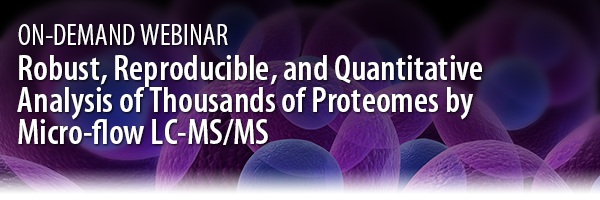Discover the advantages and place of microLC hyphenation with high-resolution accurate mass (HRAM) MS in proteomics research in this on-demand webinar. For further details and to register, click below.

Format: On-demand
Duration: Approximately 60 minutes
This webinar offers attendees a deep understanding of the advantages and place of microLC hyphenation with high-resolution accurate mass (HRAM) MS in proteomics research. Examples covering real biological samples analysis from cell lysates to urine, plasma, and cerebrospinal fluid, are presented.
Professor Bernhard Küster from the Technical University Munich discusses the place of nanoLC-MS and microLC-MS techniques in proteomics, shows the advantages of micro-flow LC-MS for high-throughput analysis of body fluids and cell lysates and describes the results of long-term microLC-MS robustness testing. He goes on to provide practical hints on MS parameters optimization for deep single-shot micro-flow LC-MS proteome analysis with DDA and DIA acquisition and presents the advantages of microLC FAIMS MS/MS analysis.
By viewing this presentation you will learn:
- advantages and limitations of microLC and nanoLC for protein analysis
- optimal micro-flow LC-MS setup, LC and MS acquisition conditions for proteome profiling
- single shot and high-throughput fractionation workflows for profiling of thousands of proteomes.
The Presenter
 Bernhard Küster
Bernhard Küster
(Professor and Chair of Proteomics, Technical University Munich)
Bernhard has been Full Professor of Proteomics at the Technical University of Munich (TUM) since 2007. He currently is also the Director of the Bavarian Biomolecular Mass Spectrometry Center, a Carl von Linde Senior Fellow of the TUM Institute for Advanced Study and Vice Dean of Information Management of the School of Life Sciences at TUM. Bernhard’s research focuses on three main topics: mapping proteomes; investigating how therapeutic cancer drugs work at the molecular level; and building proteome tools particularly in the areas of sample preparation, LC-MS/MS and informatics to improve and broaded the technological basis of proteomic technology.
Sponsor:


